![]() The information provided by our expert should not constitute a diagnosis of your condition. Always consult a medical practitioner or healthcare provider for a formal diagnosis. By making use of this content, you agree that ConceiveEasy and the expert assume no liability.
The information provided by our expert should not constitute a diagnosis of your condition. Always consult a medical practitioner or healthcare provider for a formal diagnosis. By making use of this content, you agree that ConceiveEasy and the expert assume no liability.
Fertility Pills. Fertility Supplements. Pills To Get Pregnant. Fertility Vitamins. Herbal Supplements. Prenatal Vitamins. The truth of the matter is, when it comes to pills to get pregnant, there are so many different “pills” out there to help get pregnant. Claim Your 20 Free Pregnancy Tests – Click Here
When we think of “fertility pills,” we mainly think of prescription fertility drugs, but that’s not the only thing out there when it comes to medications that can give fertility a boost.
If you have ever wondered about the different types of fertility pills out there, and just what they all are used for and what they all do, this article will most likely prove to be a helpful resource for you in your trying to conceive journey.
We will cover all sorts of different “fertility pills,” oral medications, over the counter and prescription options, and even a few things that are not “pills” at all! (We will explain that one later!)
Let’s begin, well, at the beginning, with prenatal vitamins, a fertility “pill” that almost every woman is familiar with.

When it comes to pills for getting pregnant and trying to conceive, prenatal vitamins are probably the most well known of the over the counter fertility pills. They are great for a “beginner” pill for getting ready to conceive, and are probably the very best starting point for women who need a fertility boost.
Prenatal vitamins are usually thought of as something that women take once they are already pregnant, but most people don’t know that prenatal vitamins are actually extremely helpful for women who have not yet conceived. The reason is, prenatal vitamins are chock full of, well, vitamins, as well as minerals and other nutrients that are not only vital to a developing baby, but also to setting a good foundation for conception as well.
The fact of the matter is, most women (myself included!) do not eat right or get enough nutrition from our diets alone.
In my own personal case, my weekly diet consists of several restaurant meals that I am SURE are not the healthiest options, laden with calories and sodium. Add to that a few glasses of wine and tons of coffee, a couple of fast food runs on late nights, and perhaps a couple of healthy meals thrown in here and there.
The rest of my weekly diet includes lots of “skipping out” on meals, and being “too busy” to eat in between. It’s easy to see that at least in my particular case, I am NOT getting enough vitamins and other nutrients. I would be a great candidate for prenatal vitamins to help bridge my nutritional gaps and make sure I am getting the vitamins, minerals and nutrients I need.

Prenatal vitamins are super popular for helping to get women on the right track for trying to conceive. An added bonus of prenatal vitamins is that they are available in local drug stores, supermarkets, and even online if women want to order them without even leaving their house.
And prenatals are cheap!
Women can even get their doctor to recommend a good prenatal vitamin based on their personal nutritional and medical needs. Prenatal vitamins come in gel caps, chewables, or even gummies depending on which ones women prefer. Some are even covered by insurance, so free!
While prenatal vitamins might not be the “key” or the “hidden secret” to getting pregnant, they can definitely help women to make sure that they are being their healthiest.
In some cases, prenatal vitamins can even help to prevent some birth defects. For example, spina bifida and other neural tube defects usually occur in the first few weeks of pregnancy. This is usually well before most women even know that they are pregnant! Enter prenatal vitamins. Luckily, women who are getting enough folic acid can actually prevent these birth issues. For women who are already taking a prenatal vitamin before pregnancy, it’s an added assurance to know that if or when they do get pregnant, that their baby will automatically be protected from these issues just because of the pill they are already taking daily!
As far as trying to conceive goes, I strongly and wholeheartedly believe that a good prenatal vitamin is a must when starting on this journey.
Along with tracking ovulation and knowing when her fertile days are, I believe that every woman should start her trying to conceive journey with a prenatal vitamin. It is probably one of the cheapest and easiest ways that a woman can take control of her reproductive health. If you haven’t already started on a prenatal vitamin, do it today!

We touched a little bit on folic acid above when we went over prenatal vitamins, but we are going to talk about it a little bit more because folic acid is such a very important part of trying to conceive. Doctors actually recommend that all women of childbearing age take at least 400 micrograms of folic acid every single day. Once women do become pregnant, the recommended dosage jumps up to between 600 and 800 micrograms per day.
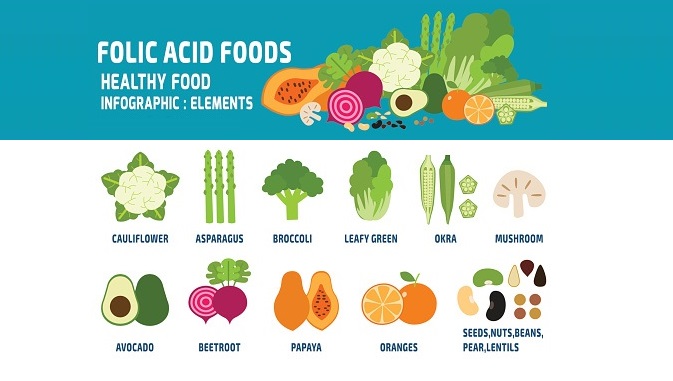
Since folic acid actually is great for preventing neural tube defects (it can reduce the risk by up to 70 percent!), it is of the utmost importance for both before conceiving and during pregnancy.
Spina Bifida is a neural tube defect that occurs when the spinal column does not close all the way, leaving the spinal column unprotected. Folic acid can help to prevent this birth defect, as well as anencephaly, which occurs when the brain does not fully develop. Women who have a family history of neural tube defects might need even more folic acid, around 4,000 micrograms per day, so women should definitely make sure to talk with their doctors to determine the proper amount for them.
Folic acid can actually help with anemia as well, and anemia has been associated with infertility.
Folic acid can come in a prenatal vitamin along with other vitamins, minerals and nutrients, or women can choose to take a stand alone folic acid supplement, whichever works best for them. Folic Acid is one of the “B” family of vitamins, so women should consider that when thinking about taking folic acid supplements. Folic acid is without a doubt one of the most important nutrients for conception, and taking the initiative to take a folic acid supplement can really go a long way towards helping with getting pregnant, as well as protecting an unborn baby on down the road.

Vitamin B6 is another pill that women sometimes want to take for fertility purposes. We already know that Vitamin B6 is important for body health, but most women don’t know that Vitamin B6 is actually extremely helpful for fertility as well. In treating PMS, Vitamin B6 is actually very well known and can help with PMS symptoms, as well as depression associated with birth control pills.
Women who have problems with regulation of blood sugar may also benefit from Vitamin B6, which is a good thing for women who are diabetic or have problems with PCOS.
For women who have luteal phase defects, Vitamin B6 is also extremely helpful for lengthening the luteal phase, which can also help with fertility.”
Many women take an extra dosage of B6 just from ovulation to menstruation, to help lengthen their luteal phase.
Of course, Vitamin B6 is available on its own as a vitamin supplement, but is also available as a part of a prenatal vitamin as well.
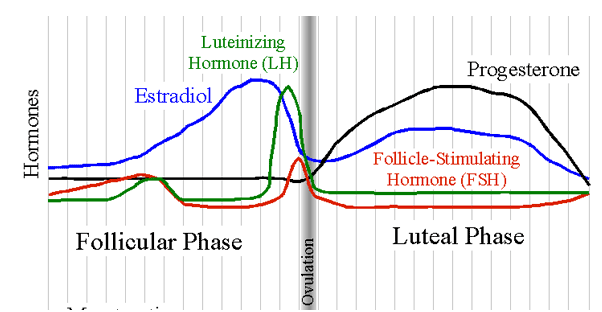

While we have already discussed the importance of both folic acid (one of the B vitamins) and Vitamin B6, we can’t forget Vitamin B12 as well. It’s a super important one of the B family of vitamins, and it can be really helpful for fertility as well. One thing that makes Vitamin B12 different than other vitamins is that it is essential for female fertility as well as male fertility.
Another thing that many women do not realize is that Vitamin B6 is also really helpful for pregnancy issues as well.
For female fertility, there has been some indication that Vitamin B12 can help to prevent miscarriage. Other studies show that Vitamin B12 can actually help with ovulation, and that women who don’t get enough Vitamin B12 can actually have problems with ovulation, and even with egg implantation during fertilization.
Men can actually see a huge benefit from taking Vitamin B12 supplements as well. Most people do not realize that low levels of B12 can actually affect sperm count. Men with higher levels of B12 in their bodies have been shown in studies to have higher sperm counts, and also healthier sperm as well. Men who have sperm count or sperm health problems can really benefit from B12 supplements. Most “One a Day” men’s vitamins contain a sufficient dose of Vitamin B12, or men can also choose a stand alone supplement if they choose to do so.

Vitamin C is one of those vitamins that we are all very familiar with. Vitamin C is so important to many health aspects.
Who hasn’t tried boosting their system with high dosages of Vitamin C during cold season?!
However, it’s also one of the most important aspects when it comes to fertility. Women with luteal phase defect can benefit from Vitamin C, since it can help to balance hormone levels and lengthen the luteal phase. Vitamin C can actually help women who have extremely heavy menstrual periods as well as helping women who have endometriosis or also uterine fibroids. Women who suffer from poor egg health can also find that Vitamin C is beneficial for that issue as well, since it can help to increase the quality of the eggs that are being produced by the body.
Something that most people do not know about Vitamin C is that this vitamin plays a really important role in male fertility as well.
In studies, Vitamin C has been shown to improve sperm health and also has been shown to help to protect sperm from DNA damage. Men who got enough Vitamin C were also less likely to have sperm problems such as sperm clumping or sperm motility problems. We don’t have many vitamins and supplements out there that are recommended for men, but Vitamin C is definitely one that is a great choice for men!

We already know how important Vitamin D is for other body functions, but it is also super important for fertility issues as well. In fact, Vitamin D is actually responsible for cell growth in the body, and it’s actually the vitamin that is important for creating sex hormones as well.
There have actually been studies that have been conducted that indicate that the majority of women who have fertility issues also, coincidentally, had low levels of Vitamin D.
While this was only a small study, it is interesting to note that women who had Vitamin D deficiency also had problems with fertility. While we all know that Vitamin D can be obtained from 15 to 20 minutes of direct sunlight per day, you can also get Vitamin D from supplements and prenatal vitamins as well.
Get outside and get your Vitamin D on today!

Making our way down the “vitamin alphabet,” we come next to Vitamin E. Like many other vitamins, this one is just super important when it comes to fertility.
In fact, vitamin E is VITAL to fertility.
Listen to this: Back in 1922, a study was done with rats regarding Vitamin E. When Vitamin E was taken completely out of the rats’ diet, they were completely infertile. However, once Vitamin E was put back into the diet of the rats, they had their fertility restored. How is that to show how incredibly important Vitamin E is when it comes to fertility?
For women who have problems with a thin uterine lining, Vitamin E can actually help to increase the thickness of the lining. Vitamin E also has been shown to reduce the instance of miscarriage as well. Women who suffer from PCOS might also find relief by supplementing with Vitamin E as well, since Vitamin E has been shown to improve glucose tolerance as well as sensitivity to insulin. This is super important to women with PCOS because these women often have problems with their bodies reactions to insulin and glucose in the body. It’s easy to see that Vitamin E does have many different benefits when it comes to female fertility.
Although it can be incredibly helpful for female fertility, Vitamin E is even MORE helpful for male fertility.
As we mentioned before, back in 1922, a study was done with rats that made them infertile when Vitamin E was removed from their diets. What is even more interesting, is that when the Vitamin E was removed from the rat’s diet, the male rats sperm were all completely immobile. However, in human studies that have been done more recently, sperm count, sperm mobility, and the amount of live and normal sperm were all improved with supplementation of Vitamin E.

Another aspect of fertility that lots of people do not understand is iron. Iron is really important for fertility. In fact, iron is the number one deficiency for women all over the world. We don’t often associate iron and/or being anemic with fertility, although many women are anemic already before even starting to try to conceive. This is because a woman’s iron levels are determined by the amount of iron she loses during pregnancy or during her monthly menstrual periods.
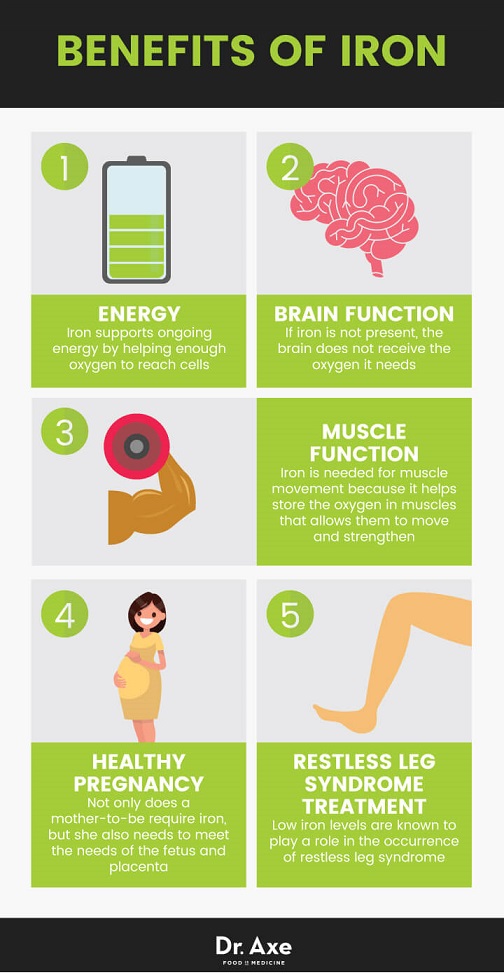
Iron is so important for women who are trying to conceive because iron is needed to help the placenta form correctly at the time of pregnancy.
Iron is also needed to ensure optimal fertility and also to help with a baby’s brain development once a woman does get pregnant. Iron is needed for delivering oxygen to the baby during pregnancy, and once a baby is born, it’s mother’s iron levels are actually responsible for the iron levels during the baby’s first six months of life.
It is crazy how important iron is to fertility, and it’s crazy how many women do not realize this.
It really is an important thing to remember, because women who do not get enough iron are likely to have problems with ovulation, and also are likely to have problems with egg health.
Low levels of iron can result in anemia. Anemia can, in turn, cause the eggs that are stored in the body to decline in quality, and if a woman with anemia does get pregnant, it is more likely that she will have a miscarriage. If a woman is determined to have low levels of iron, supplements might be needed.
Women who take iron supplements are 40% more likely to be fertile.
Recent studies and research have shown that women of childbearing age who take iron supplements on a regular basis are up to 40 percent more likely to be fertile as opposed to women who did not take iron supplements in their daily routine. That is a crazy amount, and really exciting news for women who are trying to conceive but not already taking iron supplements. A 40 percent higher chance of getting pregnant when taking iron supplements is a huge increase and all women of childbearing age who are concerned about their iron levels should see a doctor about getting their levels checked and also about the possibility of a supplement.

Another mineral that is many times forgotten about when it comes to fertility is zinc. Zinc is so important, in fact, that many experts actually call it the most important fertility mineral. What sets zinc apart from other minerals is that optimal zinc levels are important for both men and women when it comes to fertility. Oftentimes, men are left out when it comes to important fertility herbs and minerals, but not with zinc.
So, just how important is zinc? Believe it or not, around 82 percent of the world’s pregnant women are found to be deficient in zinc. How crazy is that?!
For women, zinc is super important when it comes to egg production. Zinc helps a woman’s eggs to mature properly. Zinc is also responsible for helping to maintain proper follicular fluid levels in women. Follicular fluid is what helps the egg travel down to meet the sperm, and without enough of it, an egg might not be able to make the trip.

Zinc is also incredibly important when it comes to hormone regulation in women. Women who suffer from fibroids, take note. Zinc has been shown to actually reduce the size of uterine fibroids, so that is extremely good news for women who are trying to conceive. Plus, low levels of zinc have actually been associated with early miscarriage in pregnant women, so, as you can see, it’s incredibly important to make sure you are getting enough zinc.
However, when it comes to male fertility, that’s where zinc really comes into play.
It is such an important mineral for overall male fertility. Chances are, if it has to do with sperm health, zinc is going to be involved. Getting enough zinc has been shown in a multitude of studies to improve overall sperm health as well as sperm quality, and even help prevent chromosomal defects and abnormalities that can occur because of a problem with sperm. Sperm also cannot mature without enough zinc, so as you can see, it is one of the most important minerals for fertility. Men who are trying to conceive should make sure that they are taking a vitamin with plenty of zinc in it as well, or try a stand alone supplement to make sure those sperm are as healthy as they can possibly be!
Another random fact is that things like smoking, drinking and consuming caffeine can also increase the body’s need for zinc.
Therefore, if you do those things, and you still are not getting enough zinc, this can cause your body to become even more deficient in the mineral. So, how do you know if you are or are not getting enough zinc in your daily diet? The body is actually very good at telling you, believe it or not.
White spots on the finger nails or toe nails are actually a very telling sign of zinc deficiency.
Other signs include loss of appetite, stretch marks, dermatitis, slow healing wounds, and diminished senses of both taste and smell. If you notice any of these symptoms in your daily life, it is very important that you see a doctor, since zinc deficiency is definitely not something to play around with.

Selenium is not as much of a “well known” fertility vitamin like the other ones that we have mentioned previously. We don’t talk about selenium very often, but it is important to note that it is actually a very important mineral and nutrient in the body. Most of the time, selenium is linked to thyroid health as well as immune health. It can actually be extremely beneficial for both men and women, which many people do not know. Selenium is actually found in the soil, in water, and also in foods like tuna fish and brazil nuts, as well as oysters.
For women, selenium is mostly well known as helping with breast health. There are actually studies that show that for women with breast cancer, large doses of selenium can actually increase the survival chances. Selenium is also important as relating to the thyroid and thyroid function, which helps to regulate hormones as well as metabolism. Both of these things are really very important in regards to fertility.
Selenium might be important for women, but it’s even more important when it comes to male fertility. Men lose some of their selenium in their sperm, and when a man has a selenium deficiency, it can be linked to low sperm count, poor sperm motility, and poor sperm shape. However, men who got enough selenium did not have so much trouble with these things. It’s so important that men get enough selenium, but is reassuring to note that not many men have a deficiency in this mineral.
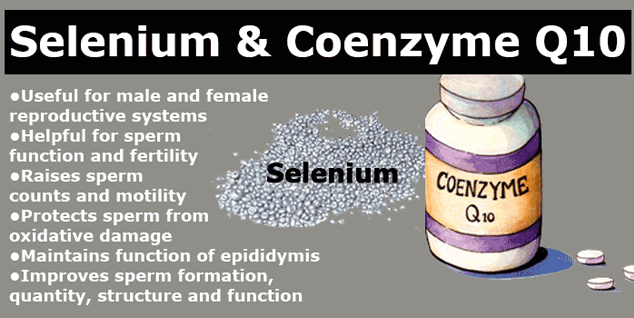

Another nutrient that is often overlooked, but still vital for fertility, is CoQ10, also known as Ubiquinol. This is a powerful antioxidant that is vital to almost every single body function. This is because almost literally every living cell in the body depends on CoQ10 for energy production.
CoQ10 or Ubiquinol is actually considered a “nutrient’ and not a “vitamin,” but it is very “vitamin-like”, because of the fact that it can be obtained from dietary sources as well as supplement form, in addition to being made by the body.
Have you ever heard of free radicals? Free radicals are unstable molecules that can wreak havoc on cell structures. These free radicals can actually contribute to health issues and premature aging.
It is important to note that levels of CoQ10 in the body have actually been shown to reduce the damage done by free radicals. While this might not sound like much of importance, we have to keep in mind that this is translated to reproductive health by improving the health of both sperm and eggs, which is also equal to healthier embryos.
Supplementing with CoQ10 can really drastically improve egg health in older moms, which can make it easier to get pregnant at an older age.
For men who might potentially suffer from low sperm counts, CoQ10 can actually help to increase sperm counts. Definitely talk with your doctor if you think that you might benefit from supplementing with CoQ10 or Ubiquinol.

Chances are, if you are at all interested in health and wellness, you have probably heard about or researched Omega 3 Fatty Acids and their effect on health. Omega 3 Fatty Acids are “good fats” for the body that have a positive effect on many body functions. The thing about Omega 3 Fatty Acids is that they are not produced by the body themselves. This can make it hard to get enough of these fatty acids, since they must be obtained from outside sources, such as food sources or by taking a dietary supplement.
Omega 3 Fatty Acids are most commonly obtained from fish oil, or also from flax oil. Omega 3 Fatty Acids also contain DHA and EPA, acids which are both essential to good health, especially when it comes to fertility and pregnancy. Let’s dig a little deeper and learn a little bit more about how Omega 3 Acids effect male and female fertility.
![]() Omega 3’s and Female Fertility
Omega 3’s and Female Fertility
When it comes to female fertility, Omega 3 Fatty Acids can help in many different ways. First of all, they can be exceptionally helpful in regulating the hormones of the body. This is probably one of the things that is the most important when it comes to fertility. Omega 3’s are also great at increasing cervical mucus as well, which can help the sperm make its way to the egg.
Omega 3’s can really improve overall fertility by increasing blood flow to the uterus. It’s also super important that women get enough Omega 3’s during pregnancy as well, since Omega 3’s like DHA and EPA can actually help to prevent low birth weight in babies and premature labor and delivery. These fatty acids also help with a baby’s development in the womb and help to make sure that everything develops and grows properly. Women should carefully choose a perfect Omega 3 supplement for them when they are starting on their trying to conceive journey.
![]() Omega 3’s and Male Fertility
Omega 3’s and Male Fertility
As important as Omega 3’s are for female fertility, they are also just as important for male fertility as well. First of all, Omega 3’s are super important for the production of sperm. DHA is also super important for the production and the maturation of sperm as well. Without enough DHA, sperm has a hard time maturing properly. All in all, when men get enough Omega 3 fatty acids in their diet or through supplementation, the resulting sperm are stronger, healthier, and perform faster and to the best of their abilities.
Another thing most people don’t know is that Omega 3’s can help to reduce blood pressure, which can help with men who suffer from erectile dysfunction problems. Also, blood flow to the genitals is improved when fatty acids are present, which can really help with all areas of male reproductive health. A good Omega 3 supplement is a great choice for men who are trying to have a baby, for sure!

While we have covered a ton of different vitamins and minerals that are important for fertility, one thing that we have yet to talk about is fertility herbs. Vitamins and minerals are things that are required for our bodies to function properly. Herbal supplements however, are all natural supplements that are found in nature and are not “required” for our bodies to function. However, these herbs can really help to boost different bodily functions.
Chinese Herbal Medicine has been around for more than 2500 years and has been used since ancient times to treat all sorts of different health problems. Fertility is one aspect of Chinese Herbal Medicine that is especially popular, since all fertility herbs are natural and have minimal side effects. There are literally hundreds of different herbal medicines that have been used for fertility over the years, and there is no way that we could ever cover all of them.
However, we are going to try to focus on some of the most popular, most effective, and overall coolest fertility herbs that are out there.
Let’s cover some of the most popular herbal fertility supplements and find out what kind of effects they can have on the body, and the reproductive system in particular.

Vitex, also known as chaste tree berry, is one of the most common and most popular fertility herbs in the world today. Vitex is grown on the chaste tree in the south of Greece and Italy, and it is the berries that are used for medicinal purposes. Vitex is definitely one of the most potent fertility herbs that is used today, and because it does not contain any hormones of its own, Vitex is used to balance hormones and help with fertility in a gentle and nourishing way.
For women who have problems with a short luteal phase, Vitex can be an amazingly helpful herb.
This is because a short luteal phase can be lengthened by taking Vitex. Vitex does not contain any hormones of its own, but it does have a way of helping the body to produce its own hormones. For women who have problems producing progesterone or luteinizing hormone, Vitex can be a great help, since it helps the body produce the hormones it needs by itself.
For women who have cases of mild endometriosis, Vitex can also be very helpful. Not only has Vitex been proven to help treat mild endometriosis, it can also keep cases of endometriosis from advancing and becoming worse. This can be incredibly helpful for women who suffer from this issue.
Another very promising aspect of Vitex is that it can help to reduce the size of uterine cysts. This can be incredibly helpful for fertility, since many women with uterine cysts have a hard time getting pregnant.
Since Vitex has a positive effect on progesterone levels, it can help to prevent miscarriage in women who are at risk of miscarriage due to low progesterone levels. However, it is very important that women only take Vitex under the direction of a doctor or health practitioner during pregnancy, since there can sometimes be some risk involved. As a side note, it should also be noted that Vitex can be helpful in treating PMS symptoms in women who have problems related to premenstrual symptoms.
As if we didn’t need to hear any more benefits of Vitex, we can’t leave out the benefits related to the menstrual period. In a study of women who had absent periods (also known as amenorrhea), more than 70 percent of the women had actually resumed their menstrual periods after using Vitex for six months.
More than 70% of the women had actually resumed their menstrual periods after using Vitex for six months.
For women who have heavier periods than usual, or who have periods too frequently, Vitex can also help with those problems as well. It really is a “do it all” fertility herb, and women who are interested in herbal fertility treatments should definitely consider it.

White Peony is another very popular fertility herb, which is already commonly known as a beautiful flower that many of us enjoy. On its own, white peony has traditionally been used for things like painful periods, treatment of PCOS, uterine fibriods and also for endometriosis. A great thing about white peony is that it pairs extremely well with other fertility herbs and can be a great herb to use in combination treatment with other ones. For example, as crazy as it sounds, white peony can be combined with licorice root for a very viable and usually successful treatment for painful periods. It also can combine well with Dong Quai, for example, for treating endometriosis pain and also anemia treatment.
It is, however, so important for women to know that they cannot use white peony once they are pregnant, since it can have some very negative effects on pregnancy.

Another very popular and useful herb for fertility is called Tribulus. Tribulus has been used in ancient times and is still very popular today as a fertility herbal treatment. A very unique thing about tribulus is that it is useful for male fertility as well as female fertility. For male fertility, tribulus can be used to improve DHEA levels in the body and in turn, can help reduce instances of erectile dysfunction.
In some studies, tribulus has also shown to decrease antisperm antibodies in both men and women. When antisperm antibodies are present, the body actually attacks the sperm and kills the sperm, since the body, for some unknown reason, identifies the sperm as a foreign invader. When antisperm antibodies are present in men, they actually kill off the sperm and damage it before it can even make it to the egg. In women, antisperm antibodies actually can prevent the sperm from reaching the egg at all. Therefore, it is a very bad thing to have antisperm antibodies in the body if you are trying to conceive.
As an aside, it should also be noted that both male and female sex drive is improved when taking tribulus, so that is just an added bonus!
For female fertility, tribulus is very helpful as well. It is actually one of the more helpful fertility herbs out there, based on its widely varying uses and ability to help all sorts of fertility problems. In studies, tribulus has shown to be extremely effective in stimulating ovulation, in fact, in over 67% of the women in the study.
It has also been shown to reduce the number and the size of ovarian cysts in rats with PCOS, during animal studies. As far as the timing and the regularity of the menstrual cycle goes, tribulus has been known to help regulate periods and have an overall “soothing” effect on the body.
It can also really combine well with other herbs, which can be helpful. However, take note that tribulus should not be used during pregnancy, as there can be adverse reactions when taken by a pregnant woman.

Another commonly used and very popular fertility herb is called Black Cohosh. Black Cohosh is found right here in North America, mainly from Canada and down the East Coast. This medicinal herb has been used for hundreds of years by Native Americans, primarily as a pain relief tonic.
One thing to know about Black Cohosh is that it is a very powerful medicinal herb, and it is not meant to be used long term.
It is used to serve a purpose, and not as an overall “support” herb. For many, many years, this herb has been used to bring back absent periods and also to help treat painful periods. This herbal treatment can also be really effective for uterine pain, prolapsed uterus, and any sort of inflamed uterine problems throughout the month. However, it is important to note that since Black Cohosh can be used to bring about bleeding, it is very important that it not be used during pregnancy except under the direct supervision of a herbal fertility expert.


This is one you might think of when it comes to making bread or muffins instead of making babies, but believe it or not, cinnamon can be a great herbal fertility supplement.
For women with PCOS, a common problem is insulin resistance and fluctuating blood sugar levels. Cinnamon has actually been shown in studies to greatly reduce insulin resistance in women with PCOS, which can help for them to conceive more easily.
Another really helpful thing about cinnamon that most women don’t know is that it can help to reduce heavy menstrual periods. For women who have naturally heavy periods, this can be helpful. It can also be helpful to women who have heavy bleeding as a result of endometriosis, PCOS, or uterine fibroids as well.
It’s also important to note that Cinnamon has been used for hundreds of years by herbalists to stop or control bleeding during miscarriage or child birth as well, so it is definitely a very important herbal supplement to include on the list.

Another one of the most common and most potent fertility drugs in the world today is called Evening Primrose Oil. This oil comes from the plant of the Evening Primrose flower, a beautiful yellow flower that is grown in the wild. The unique thing about the Evening Primrose is that it is one of the only plants in the entire world to contain GLA, which is one of the essential Omega 6 Fatty Acids that the body needs.
Therefore, Evening Primrose Oil is exceptionally helpful for balancing hormones in the body, which can in turn be extremely helpful for fertility as well. For women who suffer from severe PMS symptoms, Evening Primrose Oil can really be helpful in treating PMS, and can even be more potent when combined with another herbal supplement such as Vitex.
One of Evening Primrose Oil’s most noted benefits is for increasing cervical mucus. Without cervical mucus, or even with the wrong type of cervical mucus (hostile cervical mucus), the sperm cannot find it’s way to the egg, and will even die on it’s journey. Optimal “egg white” cervical mucus coats the sperm and protects it safely on it’s journey to fertilize the egg.
Evening Primrose Oil is great for increasing the levels of optimal cervical mucus, but it is important that women do not take it after ovulation, for reasons we will discuss below.
Evening Primrose Oil has a very prominent effect on the muscles of the uterus. This means that it can cause the uterus to contract when a woman takes it. While this is fine for the time leading up to ovulation, after a woman ovulates, she should immediately discontinue use of Evening Primrose Oil until the following month.
This is because these uterine contractions could sometimes lead to miscarriage.
It’s very important to know what you are doing when using herbal supplements like Evening Primrose Oil to ensure the safest experience possible.

Another really popular fertility herbal supplement is Maca Root. Maca is a root like vegetable, sort of like a sweet potato, that grows deep in the Andes mountains of Peru. The way the Maca itself grows is pretty amazing. The Peruvian mountains are one of the world’s harshest climates, and the Maca root grows there easily and it thrives in one of the earth’s craziest weather places.
You can already tell that this herbal supplement is going to be special just because of where it comes from.
Maca is, indeed, pretty amazing. It actually contains 31 different minerals and more than 60 different phytonutrients, making it exceptionally nourishing to all aspects of the body, fertility included.
Maca acts as an overall nourishing tonic for the entire hormonal system, which is great for fertility since it just helps to give all of the hormones a boost and helps them all to work to the best of their abilities. Maca Root also helps to balance out the hormonal system, which, as we all know, is incredibly important to fertility and conception.
Maca is also known to support normal sexual function, which, as you might imagine is pretty darn important when you are trying to conceive.
Overall, Maca is a good supplement to help nourish the entire body, and to help the reproductive system thrive.

We are including this herbal supplement in this article to serve as an example of the vastness and wide variety of herbal treatments that are out there, and also to show that there really is a treatment for just about everything when it comes to Chinese Herbal Medicine and fertility.

False Unicorn Root sounds weird, and it is, with its long cone shape, it looks much like a unicorn horn.
It grows best in Eastern Canada and on the East Coast of the United States, however, this one is very highly endangered. This herbal supplement is rarely, if ever, found in the wild anymore, since it has almost all been harvested for profit, and unlike other herbs, once the root is cut, it does not grow back on its own. Also interesting to note is that even trying to cultivate this herb in greenhouses and farm settings has not proven to be very successful. However, all of that does not take away from the fact that this is a very powerful fertility herb.
False unicorn root is used for many aspects of fertility. It is a great herbal supplement for both regulating the menstrual period as well as prevention of miscarriage in women. It has been shown to be very effective in preventing recurrent miscarriage in women who have uterine or cervical problems relating to weakness. It has also been said that this herbal supplement can help to heal uterine prolapse problems.

Yes, we are talking about THAT red raspberry, the wonderful one that we eat on cakes and in desserts.
Did you know that the delicious little fruit you love could also be a key fertility herb?
Well, it’s technically the leaf of the red raspberry plant that holds all the fertility benefits. Most often, red raspberry is used as a tea, but can also be purchased in capsule or “pill” form as well. Red raspberry leaf is usually used when trying to conceive, but it can also be used at the end of pregnancy to prepare the body for labor as well.
Red raspberry leaf is known as a uterine tonic, which means that it helps to cleanse and tone the uterus. This is great in preparation for pregnancy, and can help to sort of “detox” the reproductive organs. Red raspberry leaf is also really helpful in preventing excessive bleeding, which can be used for endometriosis and fibroids. This is also the reason that red raspberry leaf is helpful during labor and postpartum, to help prevent hemorrhaging and help with recovery after birth.
Definitely do your research when it comes to this herbal treatment (as well as all of them, for that matter!), and see if you think that red raspberry leaf is right for you.

Another popular and commonly used herbal fertility treatment is red clover. Red clover is a beautiful flowering plant, and most people do not even know about its potent healing abilities. Traditionally in Chinese Herbal Medicine, Red Clover has always been used as a great anti-cancer herb. However, it is also a really great asset as a blood cleansing herb. It can really be helpful for cleansing and detoxing the body before trying to conceive.
As a fertility herb, red clover can aid in the production of cervical mucus, which is, as we know, a very important part of a fertility regimen. Some experts in herbal medicine actually believe that Red Clover can help to clear blocked fallopian tubes, which is a huge problem for many women who are trying to become pregnant.
Experts agree that red clover sometimes must be used for several months at a time before seeing results, since it is a nourishing herb that can take quite some time to work in the body. However, it is really an effective choice for fertility boosting, and is best when used for around 3 to 6 months in preparation for pregnancy.

It is easy to see that the world of Chinese Herbal Medicine is vast, and can sometimes be a little bit confusing. There are literally hundreds of different herbs out there, many that can be used for fertility uses, but they can get very confusing as to which ones are best for which symptom, which ones should be taken during pregnancy, etc. However, there is a great solution for women who are looking for an all natural fertility supplement similar to an herbal medicine treatment, but don’t want all the guesswork involved.
Enter ConceiveEasy all natural fertility blend.
ConceiveEasy is a fertility blend made from all natural ingredients, including some of the herbal supplements mentioned above. The thing about ConceiveEasy is that all of the vitamins, minerals and herbal supplements are already measured out for women with no guesswork involved. All of the research and hard work has already been done ahead of time, by someone else, and women are left with a safe, effective, all natural fertility supplement to help give them the boost they need to get pregnant!
The ConceiveEasy supplement is 100% drug free and contains all natural ingredients, so women don’t have to worry about harmful side effects or chemicals entering their body when they are trying to conceive. Women can even take ConceiveEasy while breastfeeding, and they can start it at any time during their cycle, unlike many other fertility drugs or supplements. This supplement is designed to help combat all of the problems that many women face when trying to conceive, including PCOS, endometriosis, ovulation problems, irregular menstrual periods and much more.
Another great thing about the ConceiveEasy supplement is that you don’t need a doctor’s prescription to obtain it.
That makes it accessible to many more women, and the fact that you can order it straight from your computer or even your smartphone makes it super convenient. The folks at ConceiveEasy have even put together a great TTC kit for women who purchase their supplement. The kit includes a full two month supply of ConceiveEasy fertility blend, as well as a Getting Started guide for TTC, a basal body thermometer to help chart basal body temperature, and your choice of either home ovulation tests or pregnancy tests. This makes it so simple and convenient to use a kit like ConceiveEasy, and many women find success when using a fertility blend like this one.

The next fertility pills we are going to talk about are prescription drugs. This means, these pills are only going to be available from a doctor, and to obtain them, you must make an appointment for a doctor’s visit, get a prescription for the certain type of drug, and take it to a local pharmacy to be filled.
Sometimes, doctors will want to do testing and medical exams before they prescribe a fertility drug, so women should not expect to walk into a doctor’s visit and walk out with a fertility drug prescription right away. Many times, obtaining prescription fertility drugs takes time, and women should be patient if they are looking to get fertility pills from their doctor.

Most people who have heard of Metformin know it as a drug used to treat insulin resistance in diabetic patients. That is what this drug is most commonly used for. However, there has been some recent research that shows that Metformin may also be helpful in some cases as a fertility drug for women who have certain issues. The most common issue that can be helped by taking Metformin for fertility is PCOS, or PolyCystic Ovarian Syndrome. PCOS affects a ton of women of childbearing age, and is marked by cysts on the ovaries, hormone imbalances and difficulty conceiving.
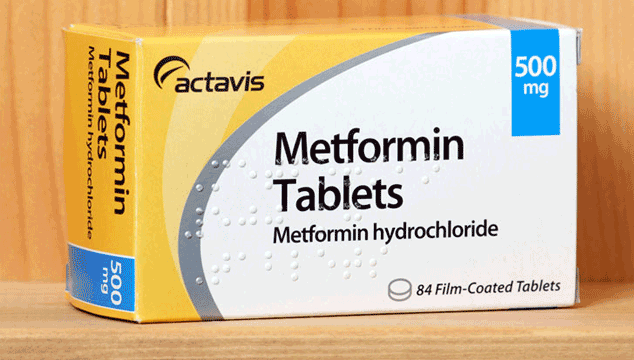
In recent studies, it has been shown that Metformin is helpful in reducing and regulating blood sugar (insulin) levels in women with PCOS. This can help women who suffer from this condition to balance out their hormones, resume regular ovulation and menstrual periods and in turn, get pregnant more easily. Doctors have also found that by continuing to take Metformin on a regular basis, women with PCOS can resume normal ovulation and normal menstrual periods for an extended period of time.
While Metformin is not as commonly used or as widely successful as Clomid (more on that later!), it is especially helpful in women who have insulin production or insulin resistance issues. Also, for women who have Type 2 diabetes, Metformin is usually the number one drug of choice for fertility and other issues.

Next, we come to the granddaddy of all fertility drugs out there, our old friend Clomid. Chances are, if you have researched fertility drugs at all before, you have heard this medication before.
Clomid is by far the most popular, most effective and most successful fertility drug on the market today. It has been used for decades and decades, and has always provided great levels of success with low levels of side effects, making it one of the most popular drugs out there.
Chances are, if you visit a fertility doctor with the intentions of starting a fertility drug regimen, you are most likely going to be started on Clomid. It is definitely a first line of defense fertility treatment, and a great starting point for doctors when they need to give women a fertility boost.
Whether you are suffering from ovulation problems or unexplained infertility, Clomid is the go-to drug of choice for doctors.
The way Clomid works is by stimulating the ovaries into ovulation. Clomid is usually taken for a few days at the beginning of a woman’s cycle, and then stopped until the next month.
This is not a pill that should be taken every day, like a birth control pill or a vitamin.
There are a specific set of 5 days that Clomid must be started and ended during a cycle in order for it to work properly. Usually beginning on day 2, 3 or 5 of your cycle. Usually, after taking Clomid, the doctor will monitor a woman to see if her follicles and eggs are developing as they should. In most cases, Clomid will stimulate the ovaries into working properly. But sometimes the doctor leaves you on your own.
For the most part, Clomid works, and it works quickly. In most women, Clomid will usually stimulate ovulation within the first three months of treatment. If Clomid hasn’t worked within three months, doctors might think about increasing the dosage of Clomid for another three months. The standard dosage is 50mg to begin.
However, if a woman is still not ovulating after that three month period, doctors will usually move on to a different form of treatment. There is usually no benefit to upping the dosage or continuing treatment of Clomid after the six month mark if no results are being seen. The good news is that most women do respond to Clomid quite quickly, so this is usually not a worry.
Another great thing about Clomid is that while it is a prescription fertility drug, it is not known for very many side effects like some other fertility drugs are. In fact, the side effects of Clomid are usually very mild, and in fact, can often mimic the symptoms of pregnancy, like tender, swollen breasts, bloating, weight gain, nausea, sensitivity to certain smells, and more.
It is also important to note that sometimes Clomid can cause multiple births.
This happens when Clomid stimulates the ovaries “too much,” causing two or more eggs to be released from the ovaries instead of just one. This can cause having twins or even higher birth order multiples, like triplets or quadruplets. However, this doesn’t happen very often, and it is just something to be made aware of if your doctor is thinking about starting you on a Clomid treatment plan. All in all, Clomid is one of the most well known and safest fertility drugs out there, so don’t be nervous or concerned if your doctor decides to start you on a drug like this one.

Another oral fertility medication that is very popular as well as very effective is called Femara, also known as Letrozole. The interesting thing about Femara is that it is a drug that was originally used to treat patients suffering from breast cancer. While Femara is sometimes used as a fertility drug, it is mostly only used as an alternative treatment when Clomid has shown not to work in certain situations. For some strange reason, women who do not respond well to treatment with Clomid will sometimes respond well to Femara.
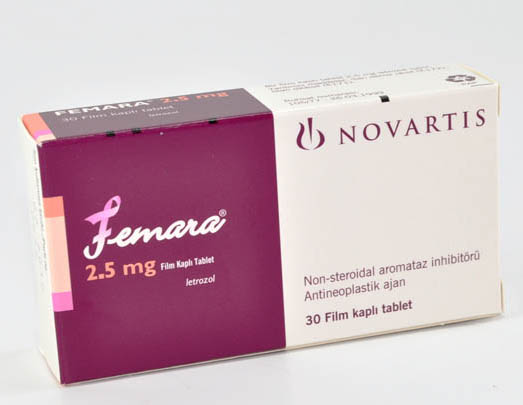
Femara works by suppressing (or lessening) a woman’s level of estrogen. When this happens, the brain and the pituitary gland (the gland in charge of all hormonal function) will increase the amount of FSH, or Follicle Stimulating Hormone that is produced by the body. For women who are already suffering from ovulation issues, or perhaps PCOS, the increased levels of FSH in the body are sometimes all that is needed to induce ovulation and create a mature egg. Sometimes, Femara is used in women who are ovulating on their own, and can be used in these situations to help to release multiple eggs instead of a single egg. When multiple eggs are released instead of just a single egg, the chances of getting pregnant are greater than when just a single egg is released.
It is important to note, however, that this also increases the chances of multiple births when Femara is used in this way.
As far as the success rates go, Clomid and Femara both have similar levels of success. However, some women have negative side effects associated with Clomid and those women might have better success being on a drug like Femara instead
It is also important to note that Femara is usually used much like Clomid, on days five through nine of a woman’s menstrual cycle.
As far as ovulation inducing drugs go, Clomid and Femara are the most commonly used and prescribed. If a woman does not respond well to treatment with Clomid or Femara, doctors usually use to move on to more aggressive and powerful fertility treatment options, such as injectable gonadotropins, IUI, or IVF treatments.

While technically not considered “pills” to help women get pregnant, we did feel that it was important to include injectable gonadotropins in this list of fertility medications because they are a very important part of fertility treatment and cannot be left out of a fertility medication list. There are many different kinds of injectable gonadotropins for fertility, and each one has a different purpose. Which one is used will depend on each woman’s particular case, and what her body is lacking.
For example, there are injections of FSH (Follicle Stimulating Hormone), and hCG injections, which are made up of Human chorionic hormone. There are also injectable medications that combine different doses of hMG (Human Menopausal Gonadotropin), LH (Luteinzing Hormone),and FSH (Follicle Stimulating Hormone), all into one shot. Which one is right for a woman’s specific case is up to the woman and her doctor, upon undergoing treatments to understand which one is right for her particular case.

Gonadotropins are usually used in cases where other oral fertility medications like Clomid did not work properly or as planned. For whatever reason, women don’t always respond the same to oral fertility drugs, and what works for one woman might not work for another. It is in these cases that injections are sometimes used. It is important to note that injectable fertility medications are not usually a first line treatment, and are almost always used only when another option does not work.
This is because injectable medications are much more powerful than oral medication, and with that comes increased risks and increased side effects.
For women who are undergoing assisted reproductive procedures such as IUI (intrauterine insemination) or IVF (in vitro fertilization), an injectable medication such as these can help to produce more than one egg, which is sometimes helpful in these treatments.
It is also interesting to note that sometimes gonadotropins can be used for men as well as women. If a man has a hormonal imbalance that is contributing to his fertility problems, an injectable gonadotropin might be used in this case. As we mentioned before, treatment with injectable gonadotropins can be more intense than treatment with traditional oral medications. The side effects of injections are usually more pronounced and more severe than with oral medications, and some women have problems with parts of the process, whether it be the side effects or the actual act of giving themselves the shots. This can be a great source of stress for some women, as can the multiple and frequent doctor’s visits which are associated with this kind of treatment.
Another important aspect of injectable gonadotropins that cannot be left out of this article is the increased risk of twins or higher order multiples when undergoing this treatment. Injections are much more powerful than oral medications and this can translate to more than one egg being released.
Some studies say that up to 30% of women will conceive twins or higher when being treated with these sorts of medications.
Another, more rare side effect of these drugs is the chance of OHSS, or Ovarian Hyper Stimulation Syndrome. This occurs when the ovaries are stimulated TOO much, and too many eggs are produced. OHSS is marked by rapid swelling of the ovaries, and women can accumulate fluid around the abdomen, heart or lungs. Studies show that around 10 to 20 percent of women will develop a mild form of OHSS which will go away on its own. Rarely, 1 to 2 percent of women will develop a more severe form of OHSS which requires for them to be hospitalized and can have serious or severe side effects
It’s also important to note that gonadotropins are very expensive, around $1000 to $5000 per treatment cycle, which of course, does not guarantee pregnancy. Insurance does not usually cover this procedure, so this is usually an out of pocket cost for the patient. Ouch!

We have included the most common fertility pills in this article, but now, we are going to throw in a few things that, although we don’t hear about them very frequently, are still extremely important when it comes to fertility.
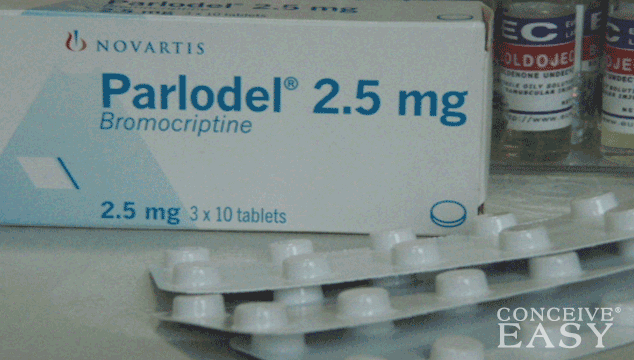
One of those drugs that isn’t often used, but is still of great importance, is called Parlodel.
Parlodel is a drug that is used for normalizing levels of prolactin in the body. What is prolactin? You might be asking yourself that question right now. Well, to explain, prolactin is a hormone that is found in the body of women who are breastfeeding or who are at the end of pregnancy. This is because prolactin is the hormone that stimulates breast milk production in order to have it prepared for when a baby arrives.
Although it might sound a little crazy, sometimes the levels of prolactin are elevated in the body even though they shouldn’t be.
Yes, this increases the levels of breast milk production in women who should not have breastmilk, but it can also wreak havoc on fertility. This is because when prolactin levels are high, the body starts producing breast milk, and then the body also stops ovulating.
This is when elevated prolactin levels can become a problem as far as fertility is concerned. These elevated levels in a woman who is not pregnant but is trying to conceive can really cause a problem, and is usually due to a small tumor at the base of the pituitary gland that is causing the body to kind of “glitch.” Doctors can sometimes remove this tumor, which is benign, or they can prescribe Parlodel in order to normalize a woman’s prolactin levels enough for her to be able to get pregnant.

This is another one of those topics that might sound a little bit crazy or “out there” as far as fertility is concerned.
It’s not often that we think of antibiotics as associated with boosting fertility, but it can in fact happen.
The reason is that if a man or a woman has an infection that is somehow associated with reproduction, like a sexually transmitted disease, this can actually wreak havoc on fertility down the road.
Gonorrhea and chlamydia are two of the most common sexually transmitted diseases that are likely to leave lasting scar tissue. Untreated infections can cause scar tissue to develop later in life. If scar tissue develops in the sex organs like the testicles, vas deferens, fallopian tubes or uterus, it can actually leave a man or woman completely infertile.
This sounds scary, but it is true.
If there is a case where a man or woman has an infection that could later on hinder their fertility, it is likely for a doctor to prescribe antibiotics. The purpose for this is not only to get rid of the current infection, but also to try to preserve fertility for down the road. In these situations, early detection is key, so any man or woman who thinks they may have a sexually transmitted disease or infection that could hurt their future fertility should get checked out right away.

As you can see, there are so many different types of pills out there to help women get pregnant. When it comes to “fertility pills,” that doesn’t always equal prescription drugs from a doctor’s office. There are tons of different over the counter options out there to help women boost their fertility and get pregnant on their own, sometimes without ever seeing a doctor.
Women can get as technically involved as they want, researching different vitamins, minerals and herbal supplements, or they can choose an “all in one” supplement like a prenatal vitamin that already has the perfect amounts of vitamins and minerals inside. They can also choose a fertility blend like ConceiveEasy, where all of the guesswork is taken out and all of the natural fertility friendly ingredients are already inside. Women can even order some of these supplements from the comfort of their own home without leaving the house.
For women who need a bigger “boost” for their fertility, doctors have many different fertility pill options that they can prescribe to patients depending on their specific needs and medical history.
Although this is probably not the news you wanted to hear, it is always a good idea (of course!) to see a doctor before beginning any kind of supplement, vitamin or other fertility boosting routine.
Seeing a doctor that knows your personal medical history and your family medical history can really go a long way towards your fertility. By letting your doctor take a look at you and what your specific needs may be, you are much more likely to find fertility success as opposed to just “winging it” and starting to try to boost your fertility on your own. You can also avoid serious problems this way, for example, what happens if you take a supplement that is a bad idea for your particular case? It’s always a good idea to run these things past your doctor before starting, just to play it safe and be on the safe side of things. Keep these things in mind when you are thinking about fertility pills to get pregnant, and you will definitely be on the right track!

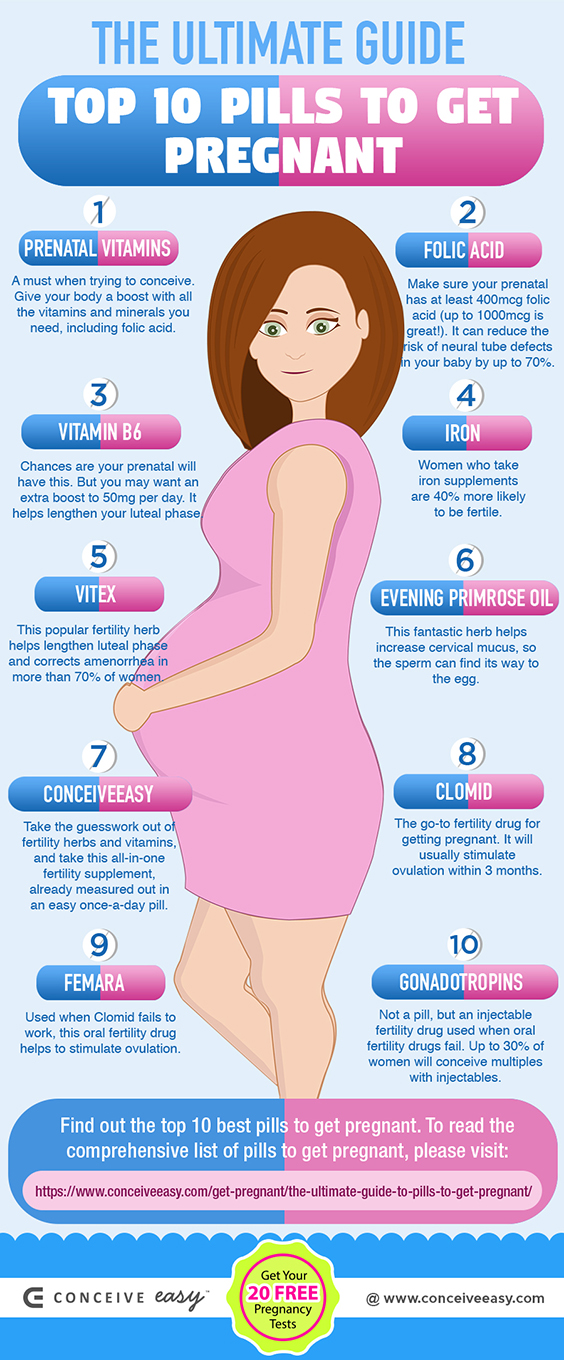

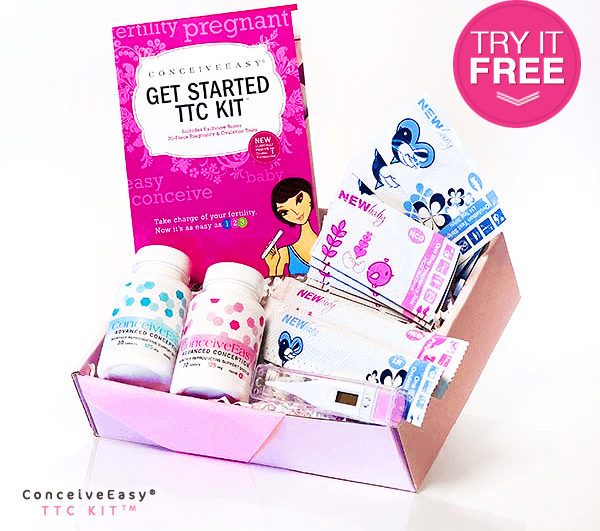








Comments